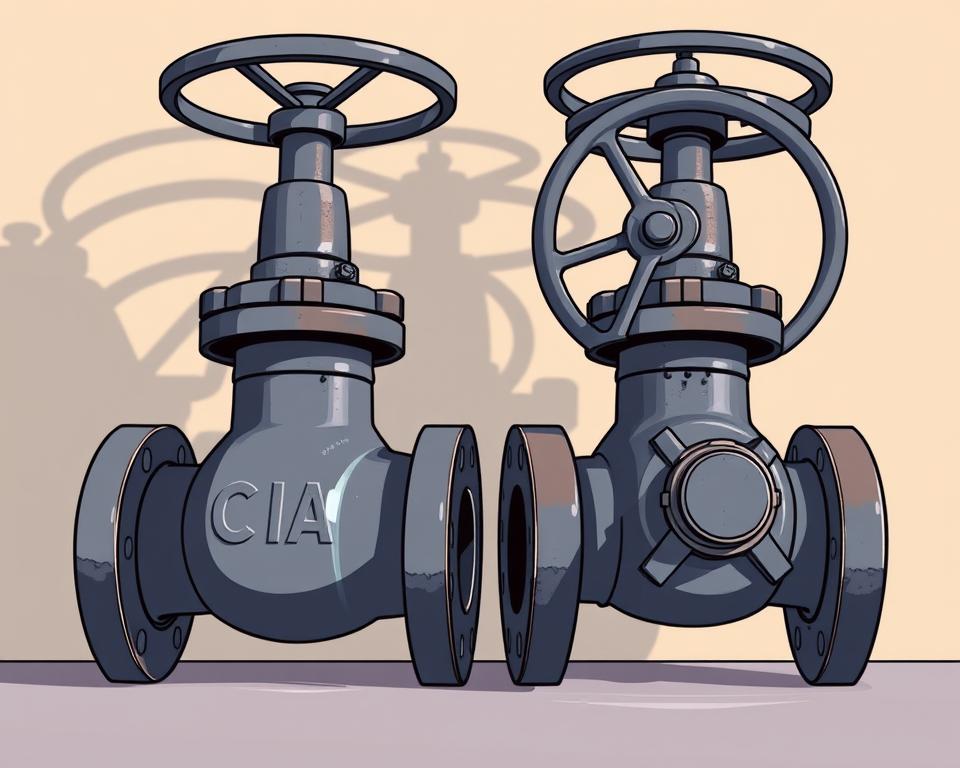Cast Iron Gate Valve Solutions: Key Features, Advantages, and Applications
Can one reliable valve reduce maintenance and extend system uptime?
At Yaxing Valve, I manufacture and supply Cast Iron Gate Valve Manufacturer and back their quality and after-sales support for U.S. clients. This product line is built for long life in waterworks and light-industrial systems.
Each gate valve has a robust iron body, a machined wedge path, and straightforward handwheel operation. That means reliable shutoff, easy upkeep, and predictable performance in buildings, fire mains, and utility distribution lines.
I support specifiers with fast submittals and transparent details: sizes, end connections, pressure classes, and accessories. We retain cart and preference data (cookies) to make reorders simple.
When you want a practical replacement or budget-smart choice for new work, compare my cast iron gate benefits with your current hardware to spot life-cycle value and practical fit.
Why Yaxing Valve Cast Iron Gate Valves Deliver Reliable Flow Control
I personally review each product at Yaxing Valve, allowing confident recommendations for tough U.S. sites.
Rugged cast-iron body engineered for industrial performance
I build every unit with a robust cast iron body that resists deformation under load. Precision machining with metal-to-metal seating provides tight shutoff at critical moments.

Flow-optimized design with minimal pressure loss
The flow path is shaped to reduce turbulence and pressure loss. This helps pumps operate efficiently while reducing energy consumption.
- I confirm dimensions and tests against ANSI standards and internal QA.
- Stem, wedge, and bonnet interfaces are finished to reduce friction and keep handwheel torque consistent long-term.
- Body thickness targets balance durability with manageable handling weight.
- My product support documents tests and standards so procurement can finalize orders fast.
| Design Feature | Primary Benefit | Spec Point |
|---|---|---|
| Cast iron body | High rigidity | Stable geometry targets met |
| Optimized gate geometry | Lower pressure loss | Supports pump efficiency |
| Stem & handwheel finish | Low-effort operation | Stable torque for extended life |
| Spec documentation | Quicker approvals | Reports aligned to ANSI |
Cast Iron Gate Valves: Materials, Design, and Performance Essentials
I detail body, sealing, and stem choices so selection and ordering stay simple.
Materials: body, bonnet, and wedge
Material stack-up: cast-iron body and bonnet, precision-machined wedge, metal-to-metal seat interface for dependable shutoff in water service and general industry.
Stem and Handwheel Options
For compact layouts, I offer non-rising and inside-screw stem options. Each screw thread form and packing arrangement is documented in my product details.
Performance limits and standards
I publish qualified pressure and temperature ranges and align end connections to common ANSI standards so engineers can confirm fit quickly.
- Handwheel and stem interface tuned for steady torque.
- Smooth internal geometry reduces headloss.
- Series identifiers and submittal-ready specs speed ordering and approvals.
| Part | Material/Type | Rating | Comments |
|---|---|---|---|
| Body and Bonnet | cast iron | Class 125/approx. 150 psi | ANSI flange dimensions; welded or bolted |
| Gate wedge | Machined alloy | −20°–180°F range | Metal-seat interface; smooth finish |
| Stem | Non-rising / inside screw | N/A | Documented thread and packing in datasheet |
| Series | YX-100 and YX-200 | Sizes 2″–12″ | Clear part numbering for quick bids |
Applications, Installation, and Operation in Today’s Industrial Environments
I advise contractors/owners on best-fit placements in today’s water and utility circuits. The goal is straightforward selection, installation, and checks so crews wrap up commissioning with no call-backs.
Applications in waterworks, buildings, and general industry
Select full-port units for low restriction across long mains, service feeds, and bypass lines.
In mechanical rooms and industrial loops, I prefer non-rising stem or inside-screw designs when vertical space is tight.
Install best practices
During handling, protect the body, lift at rated points, and avoid stressing flanges. Confirm alignment prior to final torque to prevent distortion/leaks.
Pick gaskets compatible with your media, follow a cross-torque sequence, and set support spacing to avoid pipeline sag.
Operation and maintenance notes
Set the handwheel for comfortable access and verify free stem/handwheel movement after packing adjustments.
Do periodic under-pressure torque checks, inspect wedge/packing, and verify pressure/temperature versus media. Record tag numbers in your maintenance account and link CMMS work orders.
| Topic | Recommended Action | Phase | Outcome |
|---|---|---|---|
| Application mapping | Select full-bore for mains; non-rising for tight spaces | Design stage | Less pressure loss and space efficiency |
| Handling/installation | Lift at rated points, align ends, cross-torque | Field install | Prevents leaks and flange distortion |
| Operating checks | Confirm handwheel feel; perform pressure tests | Startup and routine | Consistent operation and shutoff |
| Maintenance records | Tag valves and link to account/CMMS | Ongoing cycle | Speedy parts ID and replacements |
Good handling and careful commissioning prolong service life and keep Resilient Seated Gate Valve in top shape.
Specify the Right Iron Gate Valve with Me at Yaxing Valve
Send line size, pressure, and flow targets so I can match the right series/type to your duty and temperature envelope.
I use a short checklist so submittals pass first review: end connections, inside screw or non-rising preference, and handwheel orientation. I also note stem handwheel and screw details for clear install guidance.
Check the image gallery for high-resolution views with layouts showing clearance and operator reach. Make an account to save specs, tag valves, and link drawings plus a one-page field PDF.
Ask for a quick quote and I’ll confirm availability, lead times, alternates, and help you complete the order while you view the gallery. Cookies are only used to keep your session and cart ready.